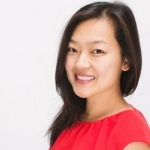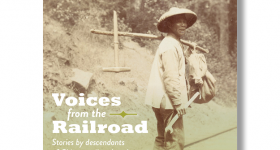Photo by Michele Asselin courtesy of The New Press
Named one of TIME magazine’s 100
most influential people in the world in 2012, activist Ai-jen Poo is hoping to
change the way we care for elders in our country. Ai-jen Poo is the director of
the National Domestic Workers Alliance, co-director of Caring Across
Generations, a MacArthur Fellow and author of The Age of Dignity,
a recently-release book on elder care in America.
Someone in the U.S. turns 65 every
eight seconds, resulting in 10,000 individuals a day and four million a year in
greater need of elder care, she points out in the book. Yet there’s a lack of
homecare workers who can provide the needed support for families.
Born and raised in Pittsburgh, PA, Poo
spent her early childhood and summers in Taiwan with her grandparents who later
moved to the U.S. for retirement. Her grandparents remained a steady and loving
force in her life and served as inspiration for her activist spirit as she
moved around the country with her parents, who later divorced.
I chatted with Ai-jen Poo on the
phone about her upbringing and her recommendations for how to address the major
challenges facing our country around elderly care.
Growing up, did you think you'd be
championing social causes and advocating for domestic workers, women, mothers
and the elderly?
Noooo. (Laughs). I actually
wanted to be a writer when I was younger. Science and medicine, which are what
my parents do, were never my strong suits.
My mother believes my activism
started in the first grade. I think my activism and strong sense of equity and
fairness have a lot to do with my parents’ values and the role that my
grandparents played in my life.
What did you do in first
grade?
[My mother] tells the story much
better, but it was when I saw a television program about the famine in Ethiopia
and decided to organize a cookie sale to raise funds for famine relief. So I
baked some chocolate chip cookies and set up a little table in front of a
supermarket to sell them.
Early in your book, you talk about
your paternal grandfather. Can you talk a little about how he influenced you
and your plight for better elder care?
My grandfather came to live with us when
he retired. He was a really, really amazing man. He taught tai chi and built a
whole following of tai chi practitioners among the Chinese immigrant community
in Connecticut. My sister and I used to watch him in the mornings when he
taught his classes.
Another ritual we had was to was to
hurry through dinner so we could go into his room and watch his favorite show Wheel
of Fortune. I’ve just got lots and lots of wonderful memories of laughing
with him.
Eventually, he had a stroke. My
father was unable to take care of him at home, so my grandfather ended up in a
nursing home. As I visited him, he became just a shadow of the person he once
was. His spirit really diminished. He was afraid, he felt completely alone and
the conditions were so dehumanizing. It was just really painful for me to see
someone who had such a vibrant life, and connected so many people, including my
sister and I, to our culture through tai chi, and yet, was going to spend the
last days of his life fearfully living alone in such dehumanizing conditions. I
will never forget the smell, the sound, the lighting of that nursing home. I do
wish he would have been able to stay at home, because that’s what he would have
wanted.
My grandmother also played a huge
role in my life. She’s one of my personal heroines. She lives independently
still in her apartment in Southern California in Alhambra. It’s not far from
her church, her church friends live in the neighborhood and she knows all her
neighbors. She can just walk across the street to get her Chinese groceries. At
88, after working so hard her whole life and surviving poverty, migration and
war and raising three kids and grandkids, she’s finally living life on her own terms.
She’s able to do that because she’s
supported by a homecare worker, Mrs. Sun. If something happens, Mrs. Sun knows
she can call my mom or uncle. Everyone’s connected, we have a strong circle of
care around my grandmother, as it should be. That gives me the inspiration that
it’s possible to create this circle of care in this country that gives everyone
the choices we need to live well as we get older. It’s only going to happen if
we work as a country to make it a priority, because there are so many huge
gaps.

Ai-jen Poo (L) with her maternal grandmother and sister in Taiwan. Photo courtesy of Ai-jen Poo.
What needs to be done to address the
elderly population boom?
Basically, we need to have a
conversation within our families, starting with two simple questions. One: How
do we plan as a family for our future caregiving needs? And two: What joys do
we anticipate in caring for each other in the future? When we actually turn
towards this challenge of caregiving needs, there’s so much possibility and
potential and opportunity to strengthen our relationships and our families
But in addition to our families, our
entire country really needs a plan. So the other thing I’m asking people to do,
is to call their local legislator, or local senator or congressperson, and ask
them what they are planning to support family caregiving needs in the future.
We need solutions at the individual
level, at the family level and at the public policy and institutional level. We
also need economic solutions in the marketplace. And when we turn toward this
challenge as a country, I have no doubt that we will create the kinds of
solutions that not only strengthen families, but actually strengthen us economically
as a society.
There will be 27 million people who
will need homecare by 2050, and the entire direct care workforce is only 3
million people. So there’s a huge need for a stronger and larger workforce. And
yet the workers that we currently have, we can hardly sustain because we don’t
pay them well enough and we don’t value their work. So these two simple
solutions of making these jobs better jobs, really investing in these jobs
being treated with dignity and respect—valuing them for their true worth in
society and in our families—can not only strengthen the care giving
infrastructure for tomorrow, but it will attract more people to this work and
in fact create millions of good jobs in this country, which is desperately
needed. We need to create 11 million jobs to deal with the jobs crisis that
we’ve been dealing with since the economic depression. This is a really clear
place where there’s going to be job growth. We have a complete win-win solution
here.
How can we create job growth for
elderly caretakers?
Well right now people find care
giving jobs in all different kinds of ways. A lot of homecare workers are
working through federally funded programs like Medicaid. And there are many who
work for individual households all over the country and they’re not registered
anywhere. And then you have companies like care.com who are matching people into jobs. So
there are all kinds of jobs being created, some through government programs,
some in the private marketplace, some through individuals and word of mouth.
I think job creation is going to
happen in all those areas. What we have to do is to make sure that wages and
working conditions across the board are fair and sustainable and we support and
lift up the companies that are really creating good jobs. And we actually
support programs that are creating good jobs through publicly-funded programs,
that we protect and expand programs like Medicaid that are currently funding a
lot of homecare jobs in states like California. So we really secure those
programs, as opposed to constantly putting them on the chopping blocks for
cuts, which is what the trend has been.
What are some other ways people can
ensure fair working conditions for homecare workers?
That’s a great question. In my book's
appendix, I provide resources for people interested in hiring caregivers. I
also include helpful information for domestic workers, like standard contract
guidelines and tips on navigating these complicated public programs.
One great resource for
employers is the Hand-in-Hand Domestic Employers website (http://domesticemployers.org). One of the things I really like is that they have
something called the Fair Care Pledge, which is something that you can take to basically say, I pledge to
bring fairness to my care giving relationship.
That means fair pay, time off and a written contract so there’s good clarity
and communication on what’s involved in the job.
There’s also lots of public policy
that we should encourage people to support like paid family leave, paid sick
days and caregiver tax credits.
Rosalynn Carter once said, "There
are only four kinds of people in the world: those who are caregivers, those who
will be caregivers, those who need caregivers and those who will need
caregivers." And usually, we’re more than one of those identities at any
given time, and that’s a beautiful thing. It connects us all.
Can you talk a little about the role
immigration plays in the caregiving field?
It’s hard to say the exact numbers,
but I would say that half of our caregiving workforce is foreign born, and at
least half are undocumented. Those are really just rough estimates. I would say
that given the tremendous needs for care giving that American families are
facing, that there is very little way to imagine us meeting that need without a
strong immigrant workforce that’s stabilized.
Right now, a lot of people are
relying on immigrant care workers. My friend, whose mother has Alzheimer’s and
lives in Staten Island, has an undocumented caregiver who’s been with her for a
long time. Having a lot of changeover in caregivers aggravates Alzheimer's symptoms.
Having that consistent care is really important. The whole family worries that
one day their undocumented caregiver will be deported or detained for some
reason that is outside of their control, and then what will happen? Of course,
they’re concerned about the caregiver's wellbeing, but they also worry about
the potential impact on their mother.
Millions of families are counting on
undocumented immigrant caregivers, but those relationships are always vulnerable
and trapped in the shadows because of workers' undocumented status. And so if
we could offer a pathway to legal status and citizenship for the undocumented
immigrant care workforce, it would really serve to bring caregivers and lot of
the families who count on them out of the shadows, which will strengthen and
increase opportunities for training, which would in turn improve the quality of
elderly care. There are enough jobs to go around in this sector, and I think
that immigrants will and must be a large part of the solution, and we should
embrace that.
This interview has been edited for
length and clarity.
For more information about Caring
Across Generations, visit www.caringacross.org. For Ai-jen Poo’s book tour dates, visit http://www.caringacrossamerica.com/book.










Comments